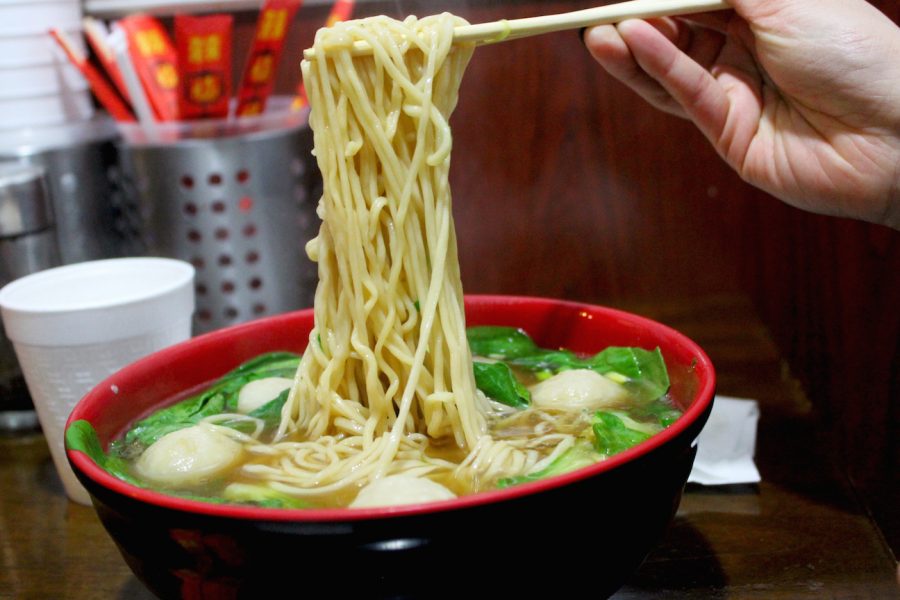New Year, New Traditions
It’s not Chinese New Year without dumplings and family, but for students who live far from home, the latter is not always possible. But that doesn’t stop students from seeking out traditional dishes — like porridge, mustard greens and citrus fruits — and even non-traditional dishes to celebrate the holiday.
For those lucky enough to visit home for this holiday, such as CAS freshman Lindsay Ngo, traditions were abound over the dinner table. Ngo is from New Jersey and spent the family meal with her grandmother in Flushing on Friday.
“We had dumplings, steamed fish, rice, soup and noodles,” said Ngo of her traditional meal. “The whole fish is supposed to signify a surplus, especially of wealth. Dumplings represent wealth as well, and noodles are supposed to mean longevity.”
CAS freshman Lucy Yu, who is from Long Island, also went home for the New Year celebrations.
“We make dumplings on Chinese New Year’s Eve every year,” Yu said. “Tomorrow on New Year’s Day, we’re having hot pot. According to my parents, they always ate these foods when they were celebrating in China, so we’re doing it here too.”
CAS sophomore Shirley Yang also has dumplings every year because of their symbolism.
“I usually eat dumplings, because they represent the gold nugget shaped currency from the olden times,” Yang said.
Dumplings at the table mean that wealth will come in the upcoming year, and many families regard food symbolism as an integral part of Chinese New Year celebrations.
This high regard for symbolism culminates in dinner spreads filled with food like whole duck for fertility, spring rolls for wealth and cabbage for posterity. CAS freshman Connie Hu explained that when she was at home, there were specific foods she ate every year with her family.
“My mom usually cooks most of the food for Chinese New Year, including changshou mian (noodles) for longevity, bao zi fan (claypot rice), tofu, niangao (rice cake) for success [throughout] the year and dumplings for good fortune,” Hu said. “I didn’t eat all of that this year, but I still had New Year’s dinner with friends.”
Hu was one of many students who couldn’t make it home for Chinese New Year. Instead, she went to Flushing, Queens to have dinner with her friends and ordered food she might have found at home to celebrate: cold sesame noodles and pork dumplings.
But other students, like Yang, didn’t seek out traditional comfort for the holiday.
“I went out with my suitemates for dim sum today to celebrate,” Yang said. “I also eat rice cakes to represent the saying ‘nian nian gao sheng’ (rising higher every year) as well as turnip cake, tangyuan (rice ball soup), spring rolls and a whole roasted chicken.”
Dim sum isn’t Chinese New Year tradition, but in New York City’s strong Chinese communities — in places like Lower Manhattan, Flushing and Brooklyn’s Sunset Park — dim sum restaurants aren’t hard to find. Restaurants that serve the traditional fare usually enjoyed at home are easy to find as well.
Ngo visited the Chinatown in Manhattan on Saturday with friends to enjoy a bowl of noodles, but afterwards, she – like Yang – tried something new.
“We got Chinese New Year themed egg waffle sundaes from New Territories,” Ngo said.
While traditional foods remind many students of home, New York City’s many contemporary restaurants allow them to expand their palettes outside of customary symbolism while still enjoying the holiday. With the Chinese population increasing in the city, the bounds of tradition and celebration are constantly expanding; it’s no wonder that students can find multiple ways to celebrate.
But even as food customs shift with students leaving home, there is one thing that is irreplaceable: family. Yang – who’s from San Francisco – said that she was upset she kept missing Chinese New Year celebrations by one week.
“I’m so used to having big raucous family feasts and making food all day, playing with my baby nephews and knitting with both my grandmas,” Yang said. “It’s a lot lonelier on the family side of the celebrations.”
A version of this article appeared in the Monday, Jan. 30 print edition. Email Kaitlyn Wang at [email protected].












































































































































